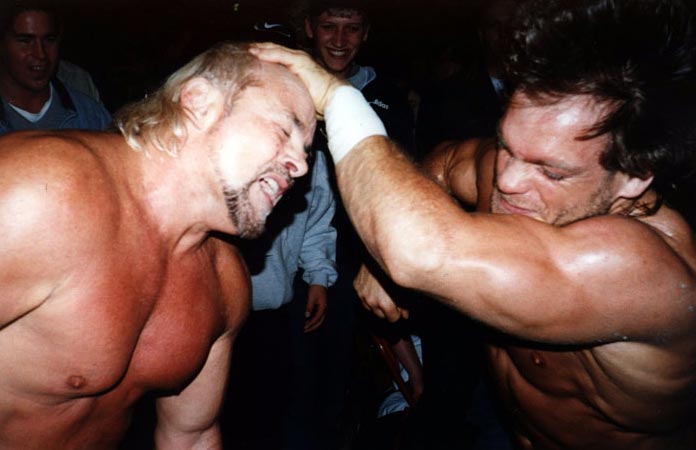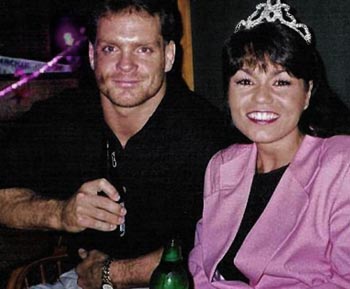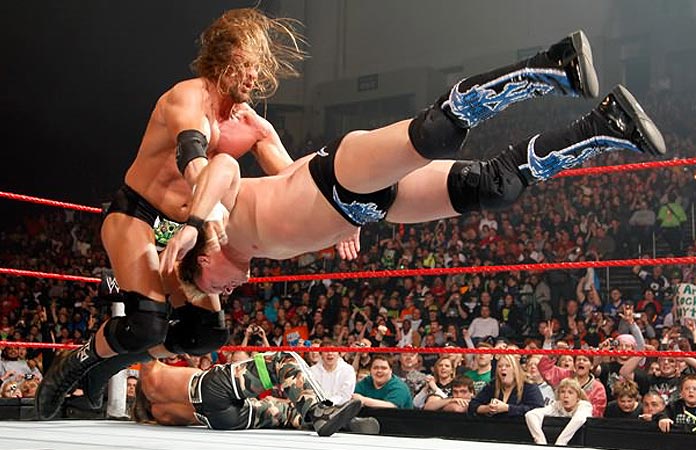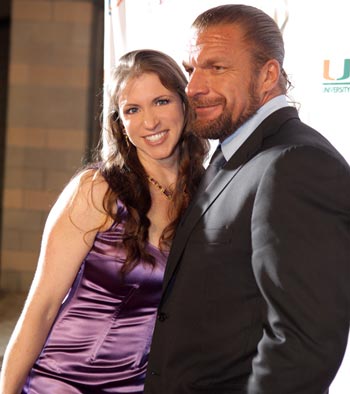Wrestling’s Dark Heart
Published on January 28th, 2013 in: Over the Gadfly's Nest, Pro Wrestling, Sports |By Paul Casey

One of the biggest problems for the modernization of professional wrestling, not covered in my last wrasslin’ bit, is the so called wrestling community. This especially concerns its Internet variant, which continues to be a barrier to any outsider views being able to filter through long enough to have any positive or lasting impact.
There are obviously the usual Internet problems of largely male communities banding together, generally hating/fearing women, gays, and otherwise divergent individuals. This happens more or less with any topic that is (ostensibly) geared towards men, so let us leave this dismal reality for the moment and focus on specifics which are unique to professional wrestling.
Chris Benoit murdered his wife, Nancy Benoit—who worked under the name Woman in WCW—and his son Daniel in June of 2007. He then killed himself. Benoit was unarguably one of the best professional wrestlers in history. He was hugely respected within the industry by the people he worked with as well as by people who passionately followed wrestling. For those people who rate matches by stars and hold often ill-explained criteria for judgment, he is without peer.
Paul Levesque, better known as Triple H, married Stephanie McMahon—the daughter of the driving force of WWE, Vince McMahon—in October of 2003. They had dated for several years and word got around that Triple H was abusing his position of authority for his own career. He developed a name for burying other talent by badmouthing them backstage, as well as refusing to put other wrestlers over and make them look good. He is alleged to have been the reason why Booker T and Rob Van Dam, among others, did not achieve main event success when they should have in WWE.
It is far more common to find the Internet wrestling community—as nebulous a thing as it can be—and many of the not-quite-professional websites that claim some degree of authority, getting angry about Triple H’s abuse of power than it is to find them being down on Chris Benoit for murdering his child and wife. This is strange. It is not that it is merely common to find harsh criticism of Triple H; it is that it so often takes the form of severe, volatile hatred.

Chris & Nancy Benoit
The obvious response is that Benoit’s death is not really connected with wrestling. It is outside of the bounds of the business and what affects the product. Benoit just happened to have a terrible end. Triple H is, however, that guy who cuts down all of those great wrestlers, purely because of his fragile ego. His behavior directly impedes the development of the best new wrestlers. This perspective is disingenuous, particularly for those within the Internet wrestling community who should know better. Chris Benoit does not just represent a sad, violent man, but is the end result of so many problems in professional wrestling which have yet to be adequately addressed, least of all by the community who claims to care most.
If there can be any comprehensible reason for Chris Benoit murdering his family, it is likely connected with the state of his brain. When he died “Benoit’s brain was so severely damaged it resembled the brain of an 85-year-old Alzheimer’s patient.” His in-ring style was extremely physical. He frequently took direct chair shots to the head, as well as taking severe bumps inside and outside of the ring. One of his finishing moves was a flying head butt, which he would do from ladders and cages.
Wrestling got extremely dangerous in the ’90s. While trying to make a name, Chris Benoit put himself in far more danger than most. The reason why he needed to go so far was because the fans demanded it. The ECW crowd was particularly insatiable. They would boo, spit, and deride anyone in “their” ring who failed to put his body in enough danger. When this standard became the mainstream with WWF and WCW, almost everyone was expected to take these chances. Those who had made their names on risks that no normal human being would consider, had to do even more ridiculous things. “Oh you got a concussion from that chair? Now you’re going to do it while on fire!”
You are more likely to find anger over the WWE refusing to air anything featuring Chris Benoit, than over the horrible circumstances of his end. I am not suggesting that one should erase such an important figure from the past, or that it is advisable to let personal behavior affect critical judgment of a performer, no matter how personally despicable. Chris Benoit’s end was however, whether large or small, a result of the wrestling business. He had a wrestling family. He was married to a woman whom he met while wrestling. If this is about disliking someone’s behavior, then surely Benoit should be top of the list. If it is about how the issue affects wrestling, then likewise Benoit should be top of the list.

Triple H is also highly respected as a wrestler by those who have worked with him, including Chris Jericho, one of the alleged victims of his politicking ways:
“He is a great worker. I think he is almost underrated as a worker because of all the side baggage that people have put on him. I worked with him when I first came in. He is a great worker and really helped me out. I’ll be honest with you, he is doing a great job behind the scenes. It’s not an easy job. He is being thrown in all the way. Vince is making him do everything. He is in charge of all the meetings, he is in charge of all the side projects . . . his legacy to me is one of the best workers that was in the company and he is going to be the guy to take the company to the next level in the next 10, 20 years.”
Chris Jericho, more than likely, does not like Triple H as a person. They had a hard time together when Jericho first entered WWF in 1999. Triple H was and is a superb technical wrestler, and although not the greatest talker of all time, was able to compete with people like Steve Austin, Mick Foley, and The Rock who are undeniably some of the greatest talkers of all time.
Triple H is not the first person to become involved backstage to better his position. Hulk Hogan was notorious for it, and is in most ways Triple H’s equivalent for drawing this kind of intense hatred. Hulk Hogan certainly did abuse his position, but he was also the single most important wrestler in history. Triple H is not at that level, but as Jericho says, sometimes in addressing these kinds of issues people go so far as to deny the very real talent and importance in an attempt to bolster their case. It is inadequate to say that Triple H fails to be the greatest of all time. It is required to state that he is one of the worst, which is such terrible bullshit.
People like Shawn Michaels were just as bad as Triple H, if not worse, and while he gets some grief, his ability is still mostly respected. Ric Flair was an atrocious booker and still wanted to hold the world title in the mid 1990s, like Hogan. He did not get the same reaction as Hogan. Bret Hart, as he detailed himself in his rather good book, had as inflated a view of his own importance as anyone. Could he deliver? Absolutely. Was he unhelpfully defensive and condescending? Absolutely. If Ric Flair didn’t believe in someone—he buried Mick Foley routinely when in a position of power in WCW—or if Bret Hart refused to put someone over because he personally disliked them—as with Shawn Michaels at Survivor Series 97—it may be frowned upon. The individual, though, and his talent are still revered.
I am not saying the relative good these men did in professional wrestling is equivalent, just that to get to the top almost everyone ends up acting selfishly, or letting their ego dictate their actions. If they can. Ric Flair, if he could, would still be wrestling in WWE. If he was handed a major title, I somehow doubt he would hand it back. It is the easiest thing for a wrestler on the way up to take issue with these people. Until they themselves are in a position where they are being asked their preferences by management, they do not know how they would react. And of course a person outside of wrestling doesn’t, either.
Professional wrestling is now and always has been severely political, clique driven, and filled with nepotism. Yes, in addressing Triple H’s behavior and being aware of how people behave backstage we may be able to address some of the problems within WWE. Making him a lightning rod for the way the business has worked as long as it has existed is not reasonable though, or helpful. Discounting his ability and importance is simply a killing blow to any argument.

Stephanie McMahon & Triple H
Chris Benoit, unlike Triple H, is not just a sign of “business as usual.” He is the sign of not only a callous indifference to the health of these athletes by the audience who demanded this kind of escalation, but of the basic untenability of this level of performance. There is some overlap between the people who demonize Triple H and those who became incensed at the WWE switching to PG programming. Whether PR driven or simply with an eye on sustainability, it helps to protect the athletes. No more chair shots to the skull is just a good idea, whether because you want your top star healthy or because you care about what happens after they leave the company. The WWE style is itself a reaction to the schedule these performers work. Removing moves that are too dangerous and slowing down the pace is not just an aesthetic choice; it is because they work hundreds of dates a year.
The sacrifice of people like Benoit is not just on their own bodies. It affects their families. While Benoit is by far the most extreme example, the issue of domestic abuse in wrestling is hardly new.
Triple H’s distaste for controlled substances when his friends—HBK, Sean Waltman, Kevin Nash, and Scott Hall—were all knee deep in them should also be mentioned. If anything has derailed more careers in wrestling, it is the abuse of drugs. Sean Waltman tried to kill himself. Scott Hall, as profiled by ESPN, is one of the most shameful wastes of talent in wrestling’s history. Seeing as some of the stories around Triple H taking issue with people—he was partially responsible for Road Dogg’s exit from WWE in the early ’00s—are to do with this kind of behavior, it seems possible that some of his power at least has been wielded for good.
When becoming so obsessed with the backstage politics and supposed movements of figures like Triple H or Hulk Hogan, we do so at the expense of other issues. The multitude of problems that were relevant in Chris Benoit’s death has still not been adequately explored. The wrestling community and wrestling publications shame themselves as incapable of serious thought by giving such disproportionate attention to the behind-the-scenes soap opera. How many people did Triple H really end? Did he end Chris Jericho, with whom he consistently had great matches, even while badmouthing him? Did he end Rob Van Dam or Booker T, both of whom became main event, world champions by the end of their WWE runs?
As with Hogan, I am sure a good portion of these stories are true, but if people genuinely care about where wrestling is going and the problems that are stopping well-adjusted, creative people doing their best, then there are far more immediate issues to be addressed. Compared with what Chris Benoit’s death represents, Triple H is just insignificant.
Time limit is exhausted. Please reload the CAPTCHA.